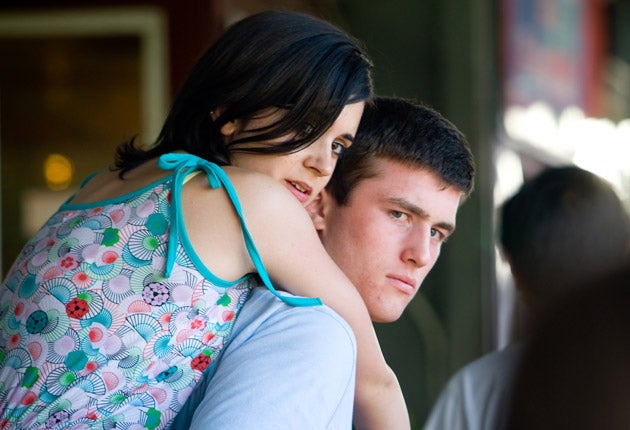Animal Kingdom, David Michod, 113 mins (15)
This menacing Australian thriller about a gang of criminals and drug addicts vividly shows how your worst enemies can often be the people closest to you

Apart from an imposingly tacky bronze bas-relief of lions, glimpsed early on, there are no four-legged creatures in the Australian film Animal Kingdom – just a terrifying pride of killer humans.
This drama by writer-director David Michod, which won the top prize at last year's Sundance Festival, is a portrait of a crime clan in Melbourne – a city apparently famous in Australia for its criminality. Its hero is 17-year-old Josh, aka "J" (James Frecheville), first seen sitting blankly on a sofa as he waits for the medics to arrive: his mother, slumped beside him, has just died of a heroin overdose. He calls his estranged grandmother Janine, aka "Smurf" (Jacki Weaver), to tell her the news. She replies as calmly as she would if he had just reported a boiler on the blink. Later, we see why: deaths in the Cody clan are a routine occurrence.
Dapper, sweetly smiling Smurf welcomes J into her home, where he meets her beloved sons, career criminals all. There's manic Craig (Sullivan Stapleton), a drug dealer permanently on the edge of panic; ineffectual lunk Darren (Luke Ford); and then there's friend and business partner Barry (Joel Edgerton), an affable bloke who takes a firm line on bathroom hygiene. Hovering in the wings is older, weirder brother Andrew, aka Pope (Ben Mendelsohn), a twitchy runt and Melbourne police's Most Wanted. It's hard at first to see why this polo-shirted squirt is so feared, but little by little, Mendelsohn paints him with delicate touches of menace: Pope offers J a sympathetic avuncular ear, and it sounds like an oblique threat. There's also a moment that, in its quiet way, is this film's answer to Joe Pesci's "You find me amusing?" rant in GoodFellas. Pope speculates that Darren's suit looks gay, and takes it from there – "Go ahead and make yourself a gay drink."
J is soon inducted into the latest round of attrition between the Codys and the local police – who think nothing of making a point by shooting suspects at close range in the face. After one slaying, the family launch a counter attack – prompting the director to make a subtle digression, quietly setting us up for a shock as he follows a pair of green young cops en route for Pope's ambush.
When the game gets brutal, J finds himself a pawn between family and police – and the most important piece on the board. He's questioned by Detective Nathan Leckie (Guy Pearce), an altogether sympathetic man and a dab hand at playing nice while exploiting the confused and cornered J. Before long, the boy learns that his family is his worst enemy: suspecting that J's talked too much, the Codys will do anything to keep him quiet. It's not only J in the line of fire, but also his girlfriend Nicky (Laura Wheelwright). She gets the worst of Pope, in a scene that's all the more troubling because the film has signalled his baleful interest in her some way ahead.
For a film about violent crime, Animal Kingdom is surprisingly low key: the horror is in its intimation of what people will do in the name of kin. Smurf potters benignly around in the background, fussing over her boys and occasionally giving them kisses that are just a bit too tender. But when her ruthless side emerges – as she leans with magnificently icy candour on a bent cop – the effect is breathtaking. Similarly, Pope is chilling not just because of what he does – although his worst crime is horrifying, and all the more so because another character looks on and fails to prevent it. But what makes him so truly scary is the quiet flickers of warped malignity that Ben Mendelsohn gives him. It's the way he creeps nervously into a kitchen that tells us that he's profoundly bad news.
The film is terrifically performed all round, but newcomer Frecheville makes a particularly strong mark, partly because his J sometimes seems barely there. At least, the other characters tend to ignore this square-headed, taciturn jock – until they start worrying about where he's got to. J's voiceover at the start feels a bit too on the nose, but ultimately it works because of Frecheville's dazed, croaky delivery – the sound of a shell-shocked teenage psyche.
Despite the claustrophobic feel – the action is restricted much of the time to police interrogation rooms and the family lounge – the story has terrific drive, with Michod leavening the static patches with elegant, discreetly bold camera moves. His direction can feel efficient and cold blooded, but it's a film of subtle touches and keen psychological bite. One extraordinary, almost throwaway scene involves characters sitting slumped in front of the TV while Australian Eighties pop act Air Supply sing their syrupy hit "All Out of Love". The song is not a camp comedy touch, however. The sound design adds a single ominous sonic undertone to the music, a darker note in the strings, so that this bland ballad somehow becomes a profoundly unnerving danger signal. In Animal Kingdom, bad things happen in the streets – but evil begins at home, and, more specifically, on the sofa.
Next Week:
Jonathan Romney takes a break with the English bourgeoisie for Joanna Hogg's island-set drama Archipelago
Subscribe to Independent Premium to bookmark this article
Want to bookmark your favourite articles and stories to read or reference later? Start your Independent Premium subscription today.

Join our commenting forum
Join thought-provoking conversations, follow other Independent readers and see their replies